#jinrikisha
Text

92 notes
·
View notes
Text
An easy way to date photos from the end of the Edo period: if there's a rickshaw in the photo, it was taken during or after 1869, so it's not an Edo period photo.
Because that's the year the jinrikisha was invented in Japan, and it spread very rapidly from there: some 200,000 were in use across the Japan by 1896 and export to other Asian countries had begun in 1874.
#history notes#historical notes#history research#historical research#history reference#historical reference#Japan#late Edo period#edo period#Meiji period#rickshaw#jinrikisha
25 notes
·
View notes
Video
Street in Japan by Wolfgang Wiggers
Via Flickr:
From a set of glass positives taken on a tour through China, Vietnam (?) and Japan. Early 20th century, unidentified photographer.
47 notes
·
View notes
Photo

MAGURAのレースライン入荷しました‼︎ 日本国内 MT7 140セット、MT8 40セットの限定品です。 https://magurajp.com/news/10758/ @magura_bicycle #magura #magurabrakes #maguraraceline #maguramt7raceline #maguramt8raceline #maguramt7 #maguramt8 #velo #vélo #vtt #velotoutterrain #mtb #mauntainbike #マウンテンバイク #atb #jinrikisha #jinrikisha_bicycle #人力車 #瀬戸市 #フサオマキザル (人力車) https://www.instagram.com/p/Ch4DQLguler/?igshid=NGJjMDIxMWI=
#magura#magurabrakes#maguraraceline#maguramt7raceline#maguramt8raceline#maguramt7#maguramt8#velo#vélo#vtt#velotoutterrain#mtb#mauntainbike#マウンテンバイク#atb#jinrikisha#jinrikisha_bicycle#人力車#瀬戸市#フサオマキザル
3 notes
·
View notes
Photo
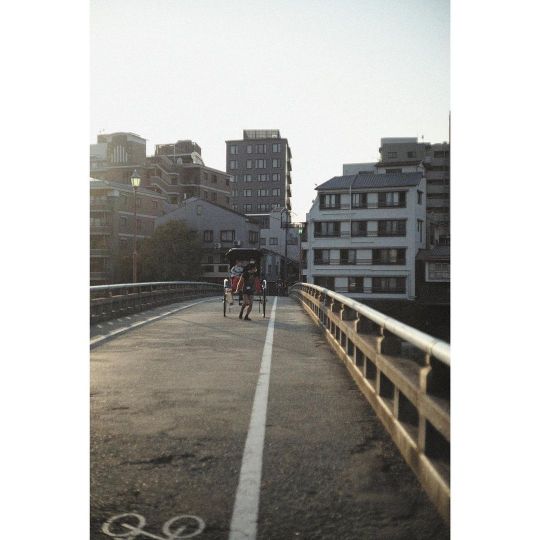
人力車 Jinrikisha on Kamogawa bridge #leica #leicaphoto #著作権フリー #人力車 #jinrikisha #n8zine #knowthismind #paradisaeart #timetobehave #northwindmag #boxspeedfeature #infilmwetrust https://www.instagram.com/p/CkTZDMNBRpO/?igshid=NGJjMDIxMWI=
#leica#leicaphoto#著作権フリー#人力車#jinrikisha#n8zine#knowthismind#paradisaeart#timetobehave#northwindmag#boxspeedfeature#infilmwetrust
0 notes
Text
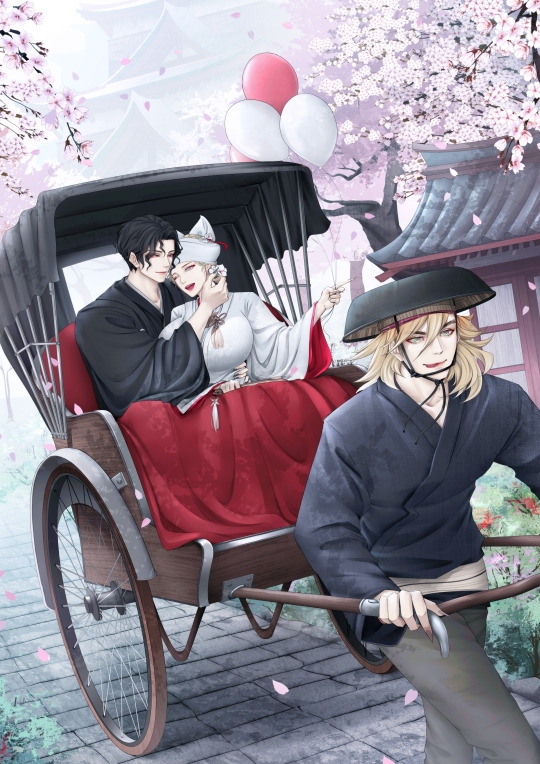
「日本の桜」
Muzan & Annavenn on a jinrikisha after their Shinto Wedding.
“Her blush, her kiss, a cherry blossom blooms.
Because of her, I love deeper than the yonder.”
— Muzan to Annavenn
Art by @.sunmoo.ny ˶ˆ꒳ˆ˵
#kmt#夢#kny oc#demon slayer oc#kimetsu no yaiba oc#kny oc art#muzan kibutsuji#demon slayer#kny#original character#oc#oc x canon#鬼舞辻無惨#kimetsu no yaiba#muzan#demon slayer muzan#kny muzan#kny fanart#romance#romantic#kibutsuji muzan#muzan x reader#kibutsuji kny#muzan x oc#couple#lovers#spring#demon slayer douma#kny douma#douma
35 notes
·
View notes
Text
Words from 極主夫道 Gokushufudō, Way of the House Husband
The number before the word indicates the chapter I found it in. Unfortunately I did not note down the page number they were on. Hopefully to be updated if/when I continue reading!
1 忽然, こつ然 こつぜん sudden, abrupt, unexpected
2 鴨, 鳧 かも, カモ duck, easy mark, sucker, sitting duck / pato salvaje
2 二足三文, 二束三文 にそくさんもん dirt cheap, very cheap / ganga, chollo, tirado de precio, baratísimo, muy barato, que cuesta cuatro perras
2 取り捌く, 取捌く とりさばく to settle (a matter)
2 奴原, 奴ばら, 奴儕 やつばら they, those guys
2 素朴, 素樸 そぼく simple, artless, naive, unsophisticated / simple, sencillo
3 肩身 かたみ shoulders, body, honour, honor, prestige, face / hombros
3 島, 嶋 しま island, one's territory (e.g. of a sex worker, organized crime gang), one's turf / isla, territorio (de una prostituta, organización criminal, etc.), césped
3 買い占め, 買占め かいしめ buying up of goods, cornering (market)
3 アコギ acoustic guitar
3 雅号 がごう alias, pseudonym, pen name, nom de plume
3 パクる, ぱくる to filch, to snatch, to pinch, to swindle, to cheat (someone out of something), to rip off, to steal (an idea, work, etc.), to plagiarize, to arrest, to nab, to round up, to open one's mouth wide and eat heartily, to gulp down food
3 足を洗う あしをあらう to quit (a shady business), to wash one's hands of, to cut one's ties with, to turn over a new leaf, to go straight, to wash one's feet
3 平和ボケ, 平和呆け, 平和ぼけ へいわボケ, へいわぼけ peace at any price (attitude), peace idiot, peace senility, complacency about peace
4 面識 めんしき acquaintance / conocido, persona conocida
4 カチ込み, かち込み カチこみ, かちこみ, カチコミ raid
4 回り込む, 回りこむ まわりこむ to go round and cut in, to take a roundabout path
4 追い詰める, 追いつめる おいつめる to corner, to drive to the wall, to run down, to track down, to chase after / acorralar, arrinconar, asediar
4 雁首揃える, 雁首そろえる, がん首そろえる がんくびそろえる to sit silently at a meeting
4 差し金, 差金, 指矩, 指金 さしがね carpenter's square, instigation, suggestion
4 チャカ, ちゃか pistol, handgun
5 ばりばり, バリバリ tearing, ripping, scratching, crunching, munching, stiff, starchy, crisp, (working) hard, actively, vigorously, energetically, making loud noises in succession (firing bullets, vehicle revving up, etc.), crackling (electricity)
5 随所, 随処 ずいしょ everywhere, at every turn
5 試みる, 心見る こころみる to try, to attempt, to have a go (at something) / probar, examinar
5 斬新, 嶄新 ざんしん novel, original, new, innovative
5 けじめ, ケジメ distinction (e.g. between right and wrong, public and private, etc.) / distinción, diferencia
5 けじめを付ける, ケジメを付ける けじめをつける, ケジメをつける to draw the line (between two situations), to make a clear distinction, to take clear responsibility for (mistakes, etc.)
6 芋, 薯, 藷 いも, イモ tuber, taro, potato, yam, yokel, bumpkin, dud, worthless thing / papa, patata, tubérculo, torpe, desmañado, batata, boniato
6 放く こく to let loose (e.g. a fart), to utter (e.g. a lie), to do
7 丁 ちょう counter for leaves in a book (esp. one with traditional Japanese-style binding), counter for blocks of tofu, counter for servings in a restaurant, counter for long and narrow things such as guns, scissors, spades, hoes, inksticks, palanquins, candles, jinrikishas, shamisen, oars, etc., even number, 109.09 m
7 一揃 ピンぞろ, ピンゾロ snake eyes (dice), double ones
7 もた, もうた having done ... by mistake, having messed up ...
8 絵図 えず illustration, drawing / ilustración, dibujo
8 三下 さんした petty underling, small fry
8 命拾い いのちびろい narrow escape from death / lograr salvar la vida en el último momento, librarse por los pelos
9 ちょび髭 ちょびひげ small mustache, short mustache
9 グラサン sunglasses / gafas de sol (eng: sunglasses)
9 剽軽者 ひょうきんもの comical person
bonus 2 極道, 獄道 ごくどう wicked, evil, profligate, immoral, wastrel, scoundrel, villain, organized crime, yakuza, underworld
bonus 2? 鎬 しのぎ ridge on the side of a sword blade, ridged pattern
bonus 3 相まって, 相俟って あいまって coupled with, together / aunando fuerzas, uniendo fuerzas
bonus 3 尋常 じんじょう common, usual
bonus 3 実弾 じつだん live bullets, live ammunition, ball cartridge, money
10 鋤, 犂 すき spade, plough, plow
10 へたこいた failed
10 指詰め ゆびつめ getting one's finger caught (e.g. in a door), getting one's finger pinched, jamming one's finger in a door, yakuza finger-cutting ritual
11 打ちのめす うちのめす, ぶちのめす to knock down, to beat (someone) up, to injure (someone) so badly they cannot recover (esp. emotionally), to overwhelm (with mental anguish, etc.)
11 奴 やっこ servant (esp. a samurai's attendant), chivalrous man (Edo period), cubed tofu (often served cold), kite shaped like an Edo-period footman, Edo-period hairstyle worn by samurai's attendants, enslavement (of a woman; Edo-period punishment for her own or her husband's crime), he, she, him, her
11 売人 ばいにん trader, smuggler, pusher, drug dealer, drug runner
124 notes
·
View notes
Photo
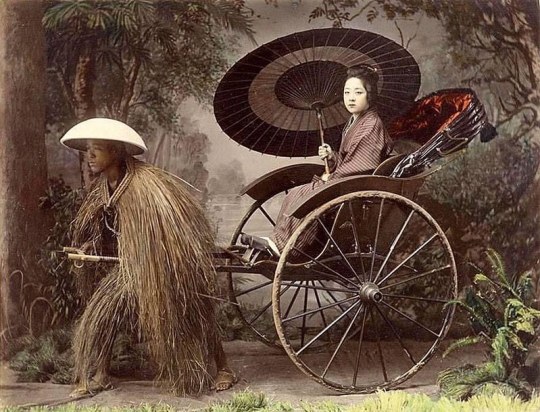
🔸 A hand-coloured studio portrait of a Japanese woman in a jinrikisha (人力車), ca. 1890, by pioneering Japanese photographer Kusakabe Kimbei (日下部 金兵衛; 1841–1934). #victorianchaps #retro #japan #portrait #goodolddays #victorian #oldphoto #vintage #nostalgia #1890s #history #pastlives #handcoloured (at Japan) https://www.instagram.com/p/CkaW7jZg2Eg/?igshid=NGJjMDIxMWI=
#victorianchaps#retro#japan#portrait#goodolddays#victorian#oldphoto#vintage#nostalgia#1890s#history#pastlives#handcoloured
10 notes
·
View notes
Text
Jinrikisha days in Japan by Eliza Ruhamah Scidmore
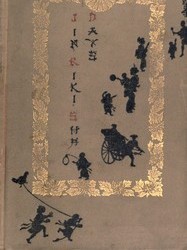
About this eBook
AuthorScidmore, Eliza Ruhamah, 1856-1928TitleJinrikisha days in JapanOriginal PublicationUnited States: Harper & Brothers, 1891.CreditsPeter Becker and the Online Distributed Proofreading Team at https://www.pgdp.net(This file was produced from images generously made available by The Internet Archive)LanguageEnglishCategoryTextEBook-No.72989Release DateFeb 19, 2024Copyright StatusPublic domain in the USA.
1 note
·
View note
Text
Rickshaws (Japanese 人力車 jinrikisha, “human–powered vehicle”) considered ; the Myth of the Golden Age and its dangers ; and the real answer to the Nuclear Waste Problem. Also I get to make one of my utterly megalomaniacal statements. Plus, Mail Call!
Direct link to archive recording (MP3, 40 MB)
1 note
·
View note
Text
youtube
ちなみに、「Quirky」は、Joe Henderson の「Jinrikisha」に触発されて出来ました。
0 notes
Text
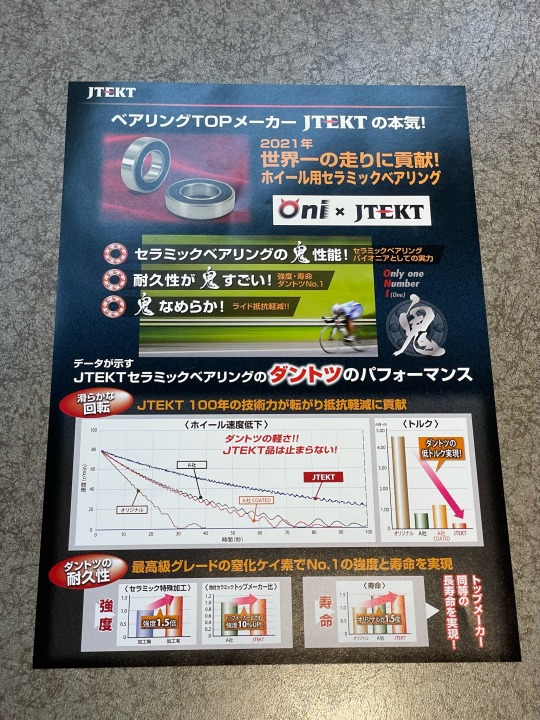


先々週のお話しですが、ベアリングメーカーJTEKTさんが「鬼ベアリング」の紹介に来て下さいました。
JTEKTさんはシールドベアリングにセラミックベアリングを世界初に採用したしたメーカーとの事でした。
今回、現物に触れた訳ではないですが、データ取りで数値化も出ていますし、入れ替えたらかなりの変化に期待出来そうです。
鬼ベアリングはMAVICのキシリウム、コスミック用と、使用出来るホイルが限られていますが、今後、その他のモデルに対応も検討してみえるとの事でした。
0 notes
Text
History of Rickshaw
The history of the rickshaw is a fascinating journey that spans continents and centuries. The rickshaw, a human-powered vehicle used for transportation, has evolved from its humble beginnings to become an iconic mode of transport in various parts of the world. Here's a brief overview of its history:
1. Origins in Japan (late 19th century): The rickshaw's origins can be traced back to Japan in the late 19th century. The word "rickshaw" is derived from the Japanese words "jinrikisha," which means "human-powered vehicle." These early rickshaws were essentially carts with two large wheels and a passenger compartment. They were drawn by a person pulling the cart from the front using a harness.
2. Spread to Asia: The concept of the rickshaw quickly spread to other parts of Asia, including China, India, and Southeast Asia. Each region adapted the rickshaw to suit its own cultural and geographical needs. In some cases, rickshaws were pulled by a single individual, while in others, two or more people worked together to pull the vehicle.
3. Colonial Era in India: During the colonial era in India, rickshaws gained popularity as a means of transportation for both Europeans and the local population. British colonizers used rickshaws as a symbol of their status, often employing Indian rickshaw pullers to transport them. This practice led to social and economic issues, as rickshaw pullers were often subjected to poor working conditions and low wages.
4. Evolution and Motorization: As technology advanced, the rickshaw evolved. In the early 20th century, cycle rickshaws became common, replacing the traditional human-pulled rickshaws. These cycle rickshaws were lighter and more efficient, with the rickshaw puller pedaling to move the vehicle.
5. Decline and Modern Use: Over time, the popularity of rickshaws waned as motorized transportation options became more readily available. Auto-rickshaws, three-wheeled motorized vehicles, emerged as a popular alternative to cycle rickshaws in many parts of Asia. These motorized rickshaws offered more comfort and speed, which made them a preferred choice for both passengers and drivers.
6. Cultural Significance and Tourism: Despite the decline in use for daily transportation, rickshaws have retained cultural significance in many regions. They are often used for tourism purposes, allowing visitors to experience a piece of local history and culture. In some places, traditional rickshaws are beautifully decorated and used for sightseeing tours.
7. Contemporary Challenges and Sustainability: In recent years, there has been a resurgence of interest in human-powered transportation due to concerns about environmental sustainability and urban congestion. Some cities have introduced modernized versions of rickshaws as a form of eco-friendly transportation, especially for short distances within busy urban areas.
In essence, the history of the rickshaw reflects the evolution of transportation, the impact of colonialism, cultural adaptation, and the ongoing struggle between tradition and modernization. While the rickshaw's role has transformed over time, its legacy continues to be felt in various parts of the world.
0 notes
Text
Words from Nukoduke, vol. 5, part 1
Words in bold are particularly relevant to the story, and words in italics seem like they’d be worth remembering outside the context of the manga. Bold and italic together means they’ve probably appeared somewhere in Nukoduke more than once. Kinda long list but it’s for a whole volume… actually it’s too long for tumblr, so splitting into three parts.
一丁 いっちょう one sheet, one page, one leaf, one block of tofu, one serving (in a restaurant), one long and narrow thing (e.g. guns, scissors, spades, hoes, inksticks, palanquins, candles, jinrikishas, shamisen, oars, etc.), one chō (unit of distance, 109.09 m), one game, one task, well then, come then / una cuadra, un bloque, pieza, un orden
打つ, 撃つ, 撲つ ぶつ to hit (a person), to strike, to beat, to deliver (a speech), to give (an address) / golpear
只々, 只只, 唯々, 唯唯 ただただ absolutely, only / con todas sus fuerzas, por todos los medios, no poder sino…
付きっきり, 付きっ切り つきっきり constant attendance, uninterrupted supervision, staying with someone all the time
諸々, 諸諸 もろもろ all kinds of things, various things, large number of people / toda clase de, todo tipo de, muchos
窒息 ちっそく suffocation, choking, asphyxia / ahogo, asfixia
軟弱 なんじゃく weakness / debilidad
妥協 だきょう compromise, giving in / acuerdo, conciliación
お雑煮, 御雑煮 おぞうに soup containing rice cakes and vegetables (New Year's dish)
たちが悪い, タチが悪い, 質が悪い たちがわるい, タチがわるい of bad character, ill-natured, nasty, vicious, wicked, malignant
鵜呑みにする, 鵜のみにする うのみにする to swallow (e.g. a story), to accept without questioning, to swallow (food) whole, to gobble up, to gulp down / aceptar sin más, aceptar sin más, engullir, tragar
跡を絶つ あとをたつ to wipe out, to put an end to / desaparecer por completo, borrarse del mapa, irse sin dejar rastro
根底, 根柢 こんてい root, basis, foundation / raíz, base, fundamento, núcleo
根付く, 根づく ねづく to take root, to strike
茶化す ちゃかす to poke fun at, to make fun of, to send up
条件反射 じょうけんはんしゃ conditioned reflex
別名で保存 べつめいでほぞん Save As (command in the File menu)
上書き保存 うわがきほぞん saving changes (e.g. to a file)
束縛 そくばく restraint, restriction, fetters, yoke, shackles, binding, confinement with rope / restringir, limitar, restricción, atadura
誑し たらし cajolement
垂らし, 滴し, 滴 たらし dripping, drop
似非, 似而非 えせ, エセ false, pseudo-, quasi-, would-be, sham, pretended, mock
お仕置き, 御仕置き おしおき punishment, spanking, smacking, chastisement, scolding / castigo, regañina, reprimenda
泣き上戸, 泣上戸 なきじょうご maudlin drinker, person who is prone to crying when drunk
キス魔 キスま compulsive kisser, person who gives many kisses, person who likes kissing others
間八, 勘八 かんぱち, カンパチ greater amberjack (Seriola dumerili), purplish amberjack, greater yellowtail
玩具, 翫具 おもちゃ, がんぐ, オモチャ toy, plaything / juguete
凝る こる to become stiff (of muscles), to get absorbed in, to develop a passion for, to devote oneself to, to become obsessed with, to get hooked on, to be elaborate, to be intricate, to be exquisite, to be particular about, to pay great attention to / entumecerse, coagularse, endurecerse, ser exigente
面目無い, 面目ない めんぼくない ashamed
面目 めんぼく, めんもく, めいぼく face, honour, honor, reputation, prestige, dignity, credit, appearance, look / cara, honra, dignidad
#these are all like#words I would like to know but don't actually come up quite enough to call them useful XD#useful words#but only sort of#vocab#Nukoduke#Japanese in manga
1 note
·
View note